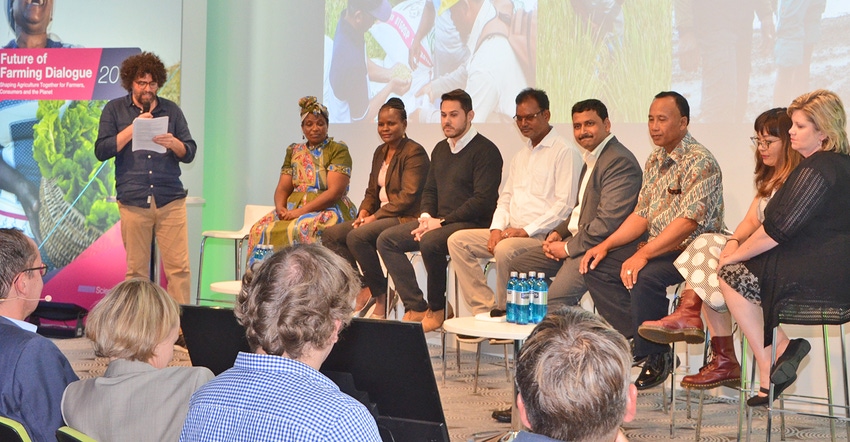October 4, 2018

Sustainability. It’s a word that continues to cause some angst because it can be rife with connotations like “organic” or “environmental” in ways that are negative to successful commercial farms. Yet being sustainable in agriculture is important if farmers are in the business of feeding people for the long haul.
During the Bayer Future of Farming Dialogue conference recently in Germany, a very diverse panel of speakers tackled the idea of sustainability from a number of perspectives. From a smallholder Kenyan widow who has created a community of producers in her village to a large-operation Kentucky farmer with a diverse commercial operation, the panel offered the full spectrum of what “sustainable” means.
And perhaps the key word is “profit.” In each case, as the farmers on the panel discussed their businesses, the key was boosting yields to raise income, so they could not only invest in their farms but also feed their families. And in each case, they talked about the long-term sustainability of having the next generation return to the farm.
Sharing their stories
For Josphine Mukiri, a smallholder farmer from Kenya who had made her first plane trip to attend the event, the definition of sustainability was simple: “It has two meanings to me. …When my husband died, I needed the farm to help take care of my children and my sister’s children; and I needed a high yield of crops to support the community.”
Mukiri lost her husband in 2014 and found that being a widow in her small village was a hardship. Yet she started farming and worked to learn techniques to improve yield, like investing in fertilizer and good seeds. She also brought together other widows in her village to create a support group called the Blessed Widows Self-Help Group. She’s a self-starter who now raises corn, beans, potatoes and cabbage on her farm.
In Brazil, Henrique Fiorese is business manager of Nossa Senhora Aparecida Farm, where he said that sustainability means “continually learning and understanding how our soil works, what it needs and what the people need to work with us,” he said. “And, how we can be prepared to face constant weather changes. We never know what’s going to happen.”
He found that on his farm, he has 17 different species of bees that he wouldn’t have thought about just a few years ago. In fact, he said that there may be one bee that’s a new discovery for the species, and it was “right under our noses; for us it’s important to know about the environment and what’s happening.”
In India, Rajesh “Pappu” Singh works to boost what he says is “sustainable income from my field, so we are provided with enough food for my family.” That also includes more income so that he can get a higher education for his children. “We’ve tripled the yield for our farm,” he added.
Sayetno Sanio farms two hectares, or about 4.5 acres, and he defines sustainability as being “wise in using applied pesticides.” He includes using fertilizer and water wisely, too. “We’re applying all of this technology, and it has increased my income by increasing my yield,” he said.
He learned about the tools for his farm from a Bayer demonstration plot in his village, where he learned about the principles of sustainability to use resources wisely.
A little terminology
For Ashley Reding, who farms nearly 30,000 acres in Kentucky, sustainability is a buzzword. “To me it’s a new word to an old practice — we called it conservation. We conserve the land and preserve our resources to pass to our children something better than what we have,” she said. “We have the ability to use the latest technology, but it’s also about using grass waterways and cover crops to protect land for future generations.”
Sustainability has minor definition differences around the world, but the core is having productive farms that can feed the farm families and produce food for others. Pappu Singh from India shared that Bayer showed him how to better manage water, and use good seed and proper irrigation techniques on his farm. That did cost more money but resulted in a three-fold yield increase. “We’re able to spend more money on irrigation, good seed and fertilizer,” he said. “And I am looking to add more land to my farm.” That’s what sustainability provides for farmers with an eye toward the future.
About the Author(s)
You May Also Like






